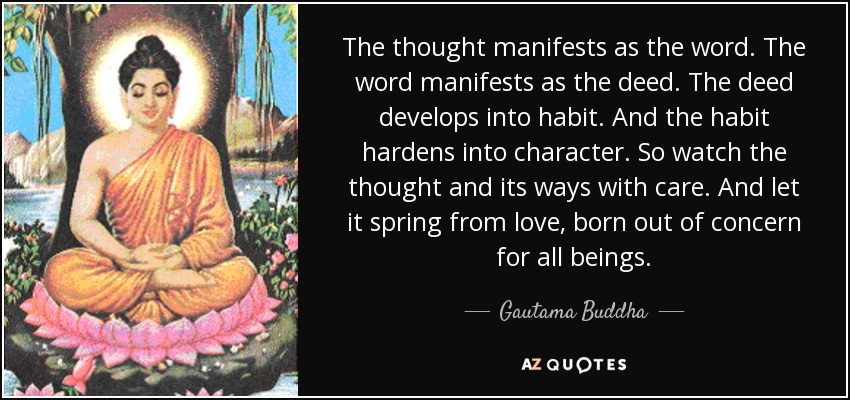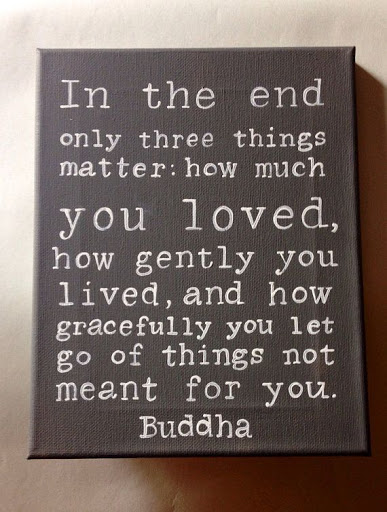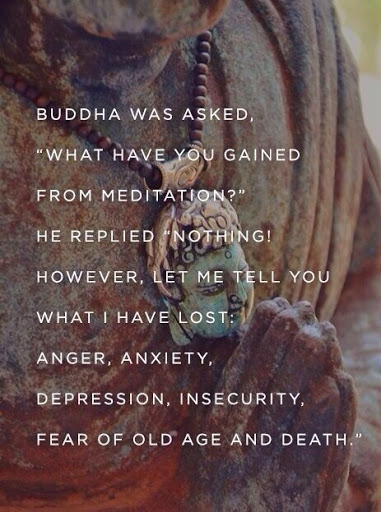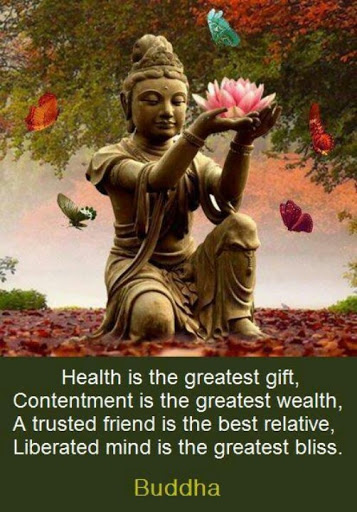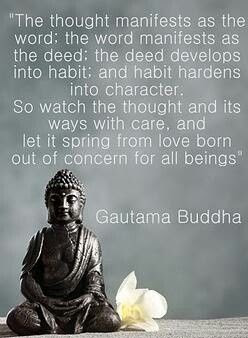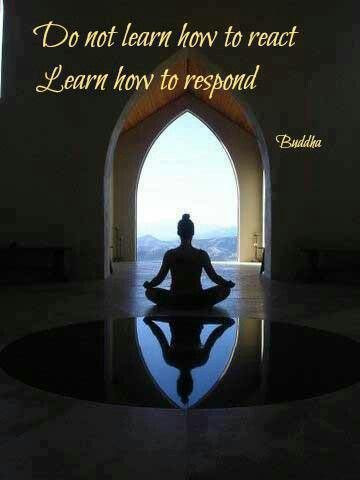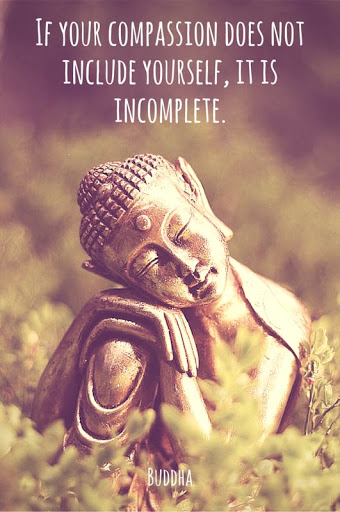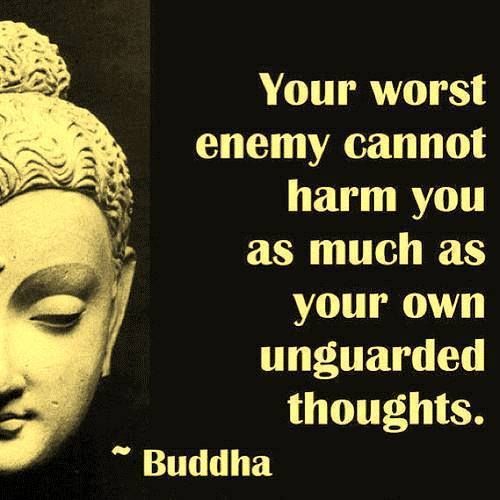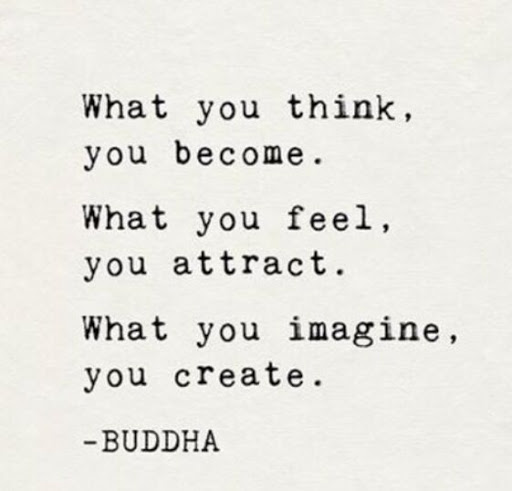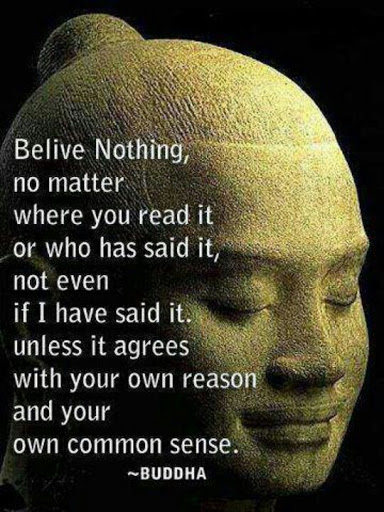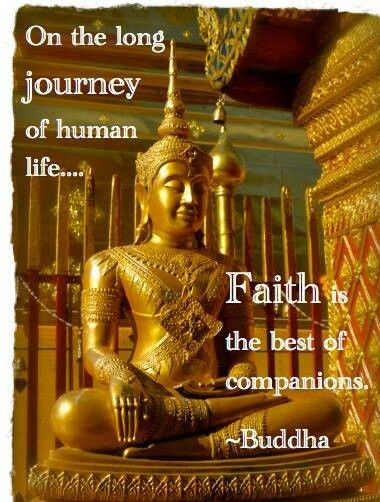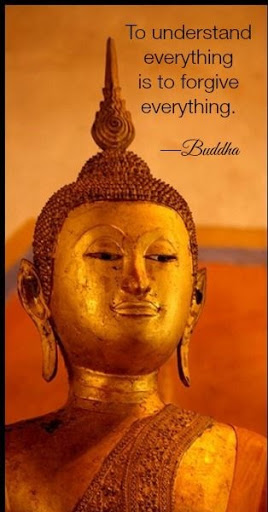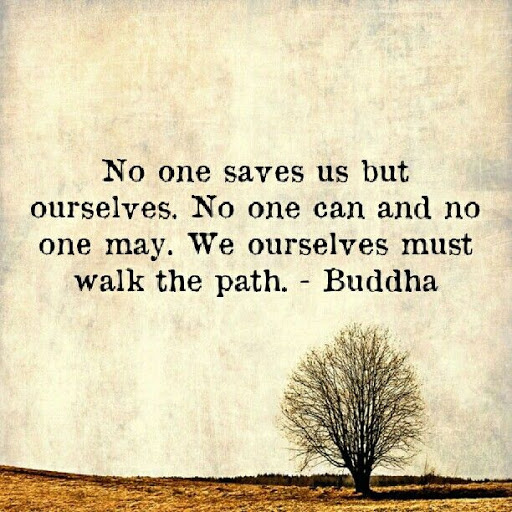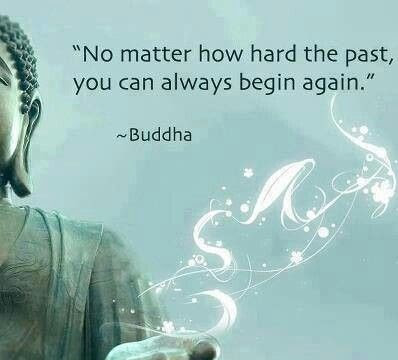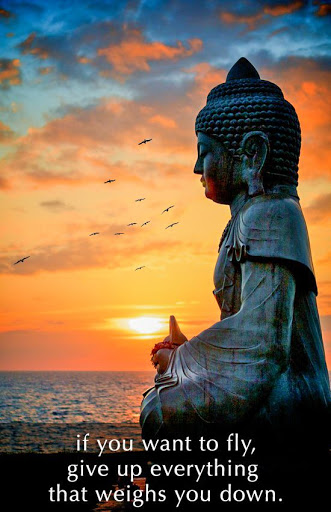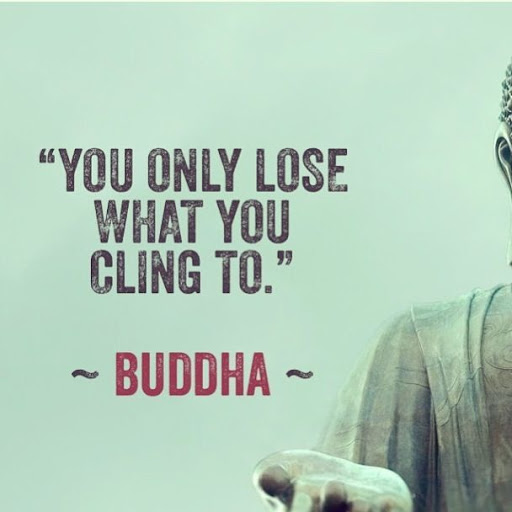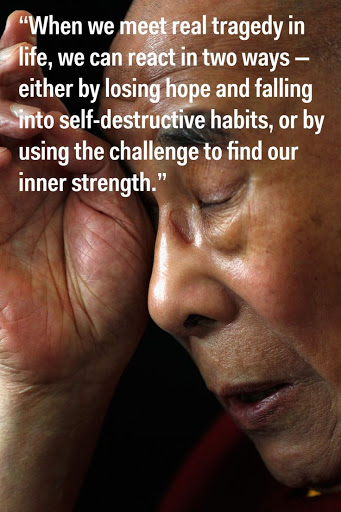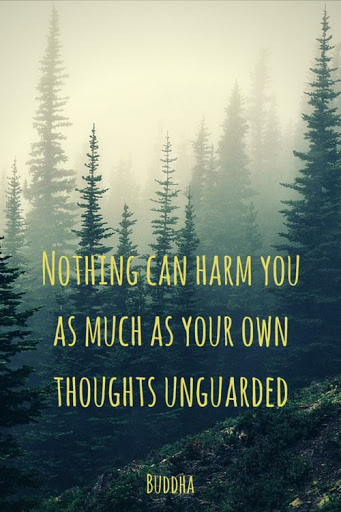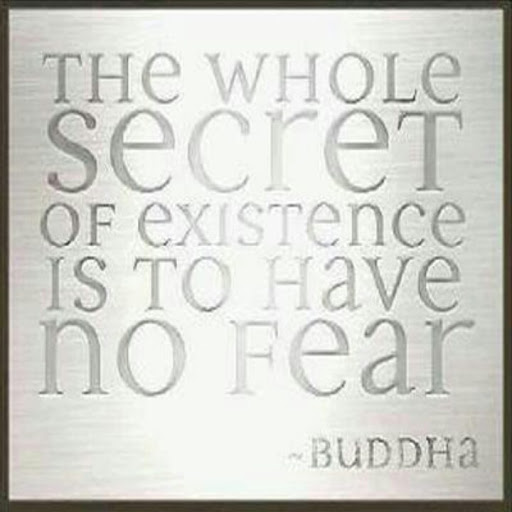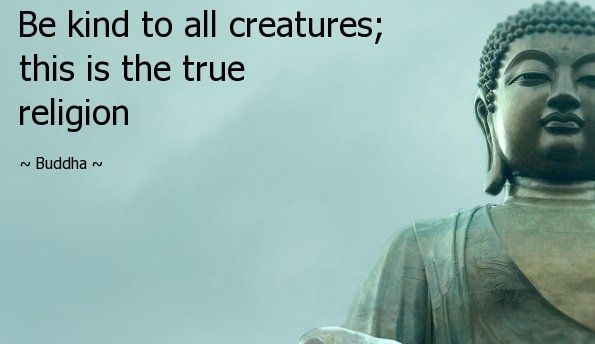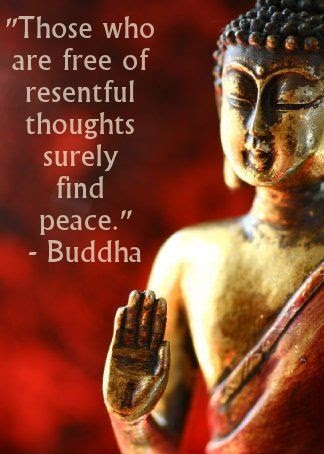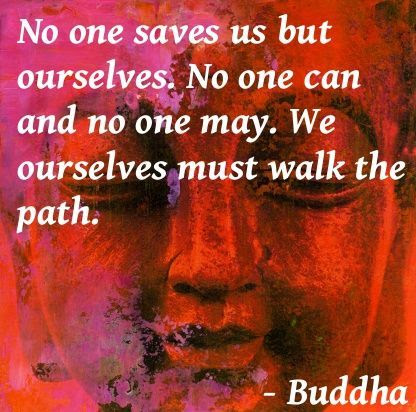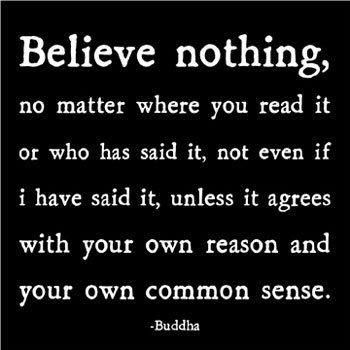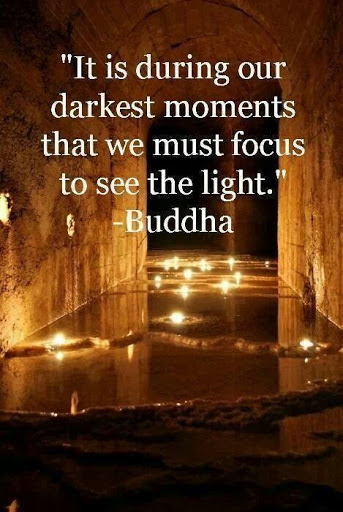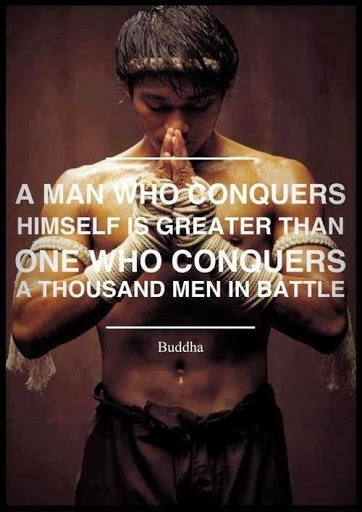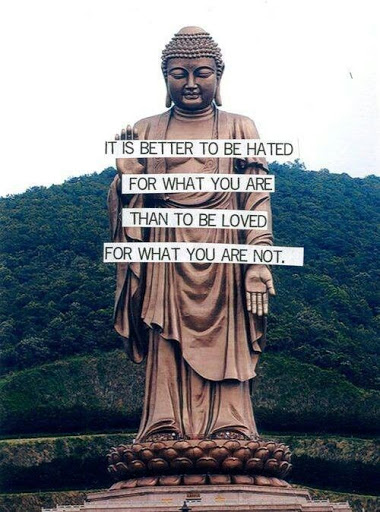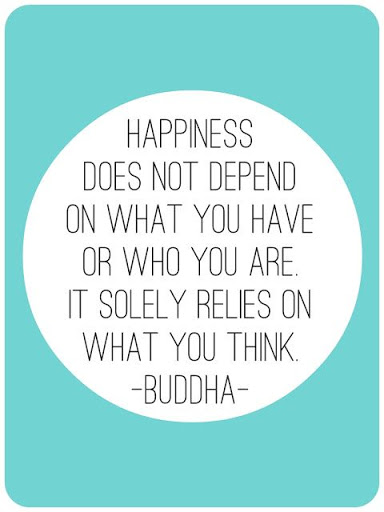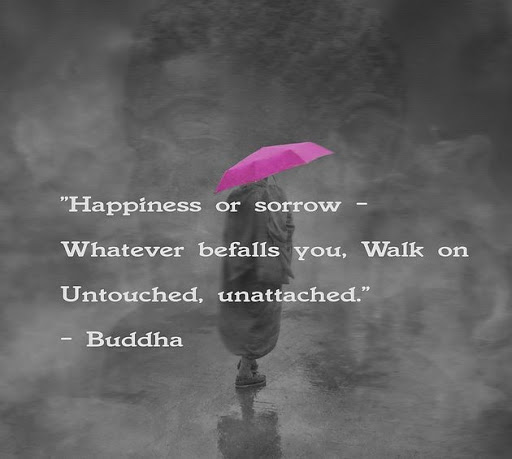The thought manifests as the word;
The word manifests as the deed;
The deed develops into habit;
And habit hardens into character.
So watch the thought and its ways with care,
And let it spring from love
Born out of concern for all beings.
When the quote above was emailed to me by a reader, there was nothing much in the actual content to trigger my suspicions. The concepts are Dharmic, and there are probably parallels in the Pali canon to each line of this poem. It seemed, perhaps, a little too neat. But I wondered, why had I never come across such a pithy, coherent, and beautifully expressed teaching in my 30 years of studying the Buddhist scriptures? Let me be clear that I haven’t memorized, or even read, the whole of the Pali canon. But I have read a lot of it, and it would be surprising for such a beautiful expression of Dharma, had it been part of the scriptures, not to have been mentioned more often by some of the scholars and Buddhist teachers whose work I’ve read.
Well, maybe I don’t read enough, because it turned out that this quote had in fact been cited as the word of the Buddha by Sharon Salzberg, Allan Lokos, Lama Surya Das, and other esteemed teachers. In fact it’s all over the web. In some cases it’s said to be from the Dhammapada, but although it has resonances with some verses from that text, that’s certainly not where it’s from.
So where does this quote originate?
The progression thoughts, words, deeds, habit, character, has its roots in 19th century Christianity, and so we find, for example, in Character and Work (1878), by Scottish theologian William Robinson Clark,
“Among those things which constitute the power or the weakness of human life, character must be allowed to have a foremost place … to this everything else leads up—thoughts, words, deeds, habits.”
Clark wasn’t the originator of this sequence, which seems to have been floating around, unattributed, in various versions. A Indiana newspaper, the Connersville Examiner, on Tuesday, July 10, 1877, had the following on its front page:
Some one has said, “Sow an act reap a habit; sow a habit and reap a character; sow a character and reap a destiny.”
It’s not surprising that the words of the quotation I was asked about should be thought to come from the Dhammapada, whose first two verses are, in Buddharakkhita’s translation:
“Mind precedes all mental states. Mind is their chief; they are all mind-wrought. If with an impure mind a person speaks or acts suffering follows him like the wheel that follows the foot of the ox.
“Mind precedes all mental states. Mind is their chief; they are all mind-wrought. If with a pure mind a person speaks or acts happiness follows him like his never-departing shadow.”
Also, the Buddha did come close to the sequence of thought … word … deed … habit … character in a series of verses in the Dhammapada, in the chapter called “Anger.” There he said:
The man whom the wise praise, after observing him day after day, is one of flawless CHARACTER, wise, and endowed with knowledge and virtue.
Who can blame such a one, as worthy as a coin of refined gold? Even the gods praise him; by Brahma, too, is he praised.
Let a man guard himself against irritability in bodily action; let him be controlled in deed. Abandoning bodily misconduct, let him practice good conduct in DEED.
Let a man guard himself against irritability in speech; let him be controlled in speech. Abandoning verbal misconduct, let him practice good conduct in SPEECH.
Let a man guard himself against irritability in thought; let him be controlled in mind. Abandoning mental misconduct, let him practice good conduct in THOUGHT.
It’s not however at all clear that the Buddha is saying here that thought gives rise to word, which gives rise to deed. Generally acts of body, speech, and mind are presented as a kind of co-equal trinity, with none of them being presented as the origin of the others. But those terms are there, and in the same order, which is interesting. Also, the Dhammapada is a collection of independent quotes, and so the ordering reflects the interpretation of the collators of the text, and not necessarily the way that the Buddha would have expressed himself. I’m not arguing that he would have disagreed with the ordering of the verses, just that he almost certainly wasn’t responsible for it.
I haven’t yet found a definitive origin for the formulation that starts: “The thought manifests as the word…” The earliest citation of this in a book seems to be from a 1981 book, The Handbook of Innovative Psychotherapies (page 480) in chapter 34, “Meditation,” by Roger N. Walsh. There it’s picked up a new last line, “For all beings are one.” Walsh, ascribes it to that prolific author, “Anonymous.”
So I don’t know exactly where this quote originates. The best I can say at present is that it emerged from many minds that were engaged in a mid- to late-19th century Christian exploration of character building — arguably an attempt to create a Christian equivalent of karma.
And then at some point before 1981 it acquired a coda about “concern for all beings” that sounds distinctly Buddhist. But the quote as a whole is not from the Buddhist scriptures. We can be fairly sure the Buddha never said this, although we can be equally sure that he said things like this.
-
The thought manifests as the word. The word manifests as the deed. The deed develops into habit. And the habit hardens into character. So watch the thought and its ways with care. And let it spring from love, born out of concern for all beings.
Topics
- Love
- Anger
- Inspirational
- Buddhist
- Spring
- Character
- Care
- Habit
- Concern
- Born
- Deeds
- Watches
- Way
- Law Of Attraction
- Attraction
- Deeds And Words
- Manifest
- Buddhism
- Attraction And Love
- Law Of Attraction Love
- Inspirational Buddhist
- Wise Buddhist
- Love You
- Inspiration
Embed:
Translation
Find a translation for this quote in other languages:
Select another language:
- — Select —
- 简体中文 (Chinese — Simplified)
- 繁體中文 (Chinese — Traditional)
- Español (Spanish)
- Esperanto (Esperanto)
- 日本語 (Japanese)
- Português (Portuguese)
- Deutsch (German)
- العربية (Arabic)
- Français (French)
- Русский (Russian)
- ಕನ್ನಡ (Kannada)
- 한국어 (Korean)
- עברית (Hebrew)
- Gaeilge (Irish)
- Українська (Ukrainian)
- اردو (Urdu)
- Magyar (Hungarian)
- मानक हिन्दी (Hindi)
- Indonesia (Indonesian)
- Italiano (Italian)
- தமிழ் (Tamil)
- Türkçe (Turkish)
- తెలుగు (Telugu)
- ภาษาไทย (Thai)
- Tiếng Việt (Vietnamese)
- Čeština (Czech)
- Polski (Polish)
- Bahasa Indonesia (Indonesian)
- Românește (Romanian)
- Nederlands (Dutch)
- Ελληνικά (Greek)
- Latinum (Latin)
- Svenska (Swedish)
- Dansk (Danish)
- Suomi (Finnish)
- فارسی (Persian)
- ייִדיש (Yiddish)
- հայերեն (Armenian)
- Norsk (Norwegian)
- English (English)
Quote of the Day
Today’s Quote | Archive
Would you like us to send you a FREE inspiring quote delivered to your inbox daily?
Citation
Use the citation below to add this quote to your bibliography:
Embed
Image source:
Embed as image:
Embed as a link:
We need you!
Help build the largest human-edited quotes collection on the web!
Our favorite collection of
Famous Authors
»
Browse Quotes.net
Quiz
Are you a quotes master?
»
Who said, «When a man knows he is to be hanged in a fortnight, it concentrates his mind wonderfully.»?
-
A. Samuel Johnson
-
B. Queen Elizabeth II
-
C. John Wayne in «The Searchers»
-
D. Roy Rogers
Thank you
Thanks for your vote!
We truly appreciate your support.
Best Life Quotes By Buddha
Gautama Buddha also is known as Siddhartha Gautama. With the help of Siddhartha Gautama’s teachings, Buddhism takes place. Gautama Buddha was born in Lumbini. Siddhartha Gautama realizes that meditation is the only path to awakening. Gautama decides to live his life as a Yogi. Gautama starts seated under a Pipal tree which is known as Bodhi Tree. Gautama meditation regular 49 days, to have attained Enlightenment.
Gautama Buddha, also known as Shakyamuni Buddha or Siddhartha Buddha or Buddha founded Buddhism. He was one of the many Sramana philosophers of his time. According to the Buddhist tradition, Buddha was born in Lumbini, now in Nepal. He was brought up by his mother’s younger sister and his father wanted him to be a great king. It is said that his father shielded him from religious teachings and human suffering.
Buddha was married to Yashodhara at the age of 16 and they both had a son named Rahula. When he was 29; he saw an old man despite his father’s efforts to hide from him the aged, suffering old people. This depressed him and he quit his palace for the life of a mendicant. According to the early Buddhist texts, when Buddha realized that meditative dhyana was the right path to awakening. Several life lessons and teachings have been provided by Buddha in his biographies and Buddhist texts.
One of my all-time favorite Buddha quotes is, “As you walk, eat, and travel, be where you are. Otherwise, you will miss most of your life”. This is quite true in all aspects of our life. Be it something that you are doing, eating, or be it someplace you are traveling to; we can never experience life to its best if we are not completely present
there, at that particular moment. We need to be mentally and physically present to see life happening. That is how we will never miss a single bit of our life.
Buddha has taught us so many life lessons; each lesson is a gem and gives us an opportunity to understand the world and make it a better place. His teachings and ideologies help us walking on this path of life and helping us throughout the journey. Buddha once said, “You only lose what you cling to”. It is very difficult to not get used to the things that we have in our life; the things that help us grow and be what we are. And we can only lose those things that we cling on to; how can someone lose something that he never had. To live a happy and content life; we must not forget the lessons that Buddha have taught us, they will help us face the hardships of life with a smile on our face and faith in our heart because, in the end, it is the faith that matters.
From that time Gautama was known as Lord Buddha. Buddha changes people like Angulimala, Cannibals such as Alavaka. Buddha totally changed the lives of many who believed in him. Buddha believed that by meditation everyone can get to awakening. Gautam Buddha is also known for giving the best quotes about human life. He gave so many spiritual and inspirational quotes to this world. Which is really helpful for those who follow them in their life.
Here we are with Best Buddha Quotes which will help many of us to change our lives.
1. “In the end, only three things matter: How much you loved, how gently you lived, and how gracefully you let go of things not meant for you.”
2. “Buddha was asked,”what have you gaines from mediation?”
He replied “NOTHING”! However let me tell you what i have lost: anger, anxiety, depression, insecurity, fear of old age and death.”
3. “When the student is ready, the teacher will appear.”
4. “The less you respond to negative people, the more peaceful your life will become.”
5. “Health is the greatest gift, contentment is the greatest wealth, A trusted friend is the best relative, liberated mind is the greatest bliss.”
6. “The thought manifests as the word: the word manifests as the deed: the deed develops into character. So watch the thought and its ways with care, and let it spring from love born out of concern for all beings.”
7. “Do not learn how to react learn how to respond.”
8. “If your compassion does not include yourself, It is incomplete.”
9. “Everything that has a begining has an ending.
Make your peace with that and all will be well.”
10. “If anything is worth doing, do it with all your heart.”
11. “Your worst enemy cannot harm you as much as your own unguarded thoughts.”
12. “The root of suffering is attachment.”
13. “Holding onto anger is like drinking poison and expecting the other person to die.”
14. “All that we are is the result of what we have thought.”
15. “Do not dwell in the past, do not dream of the future, concentrate the mind on the present moment.”
16. “What you think you become, what you feel, you attract. what you imagine, you create.”
17. “Nothing can harm you as much as your own thoughts unguarded.”
18. “Relax nothing is in control.”- Buddhist Meditation quotes by Lord Buddha.
20. “The trouble is you think you have time.”
21. “Your work is to discover your world and then with all your heart give yourself to it.”
22. “Believe nothing, no matter where you read it or who has said it, not even if i have said it. Unless it agrees with your own reason and your own common sense.”
23. “Do not dwell in the past, do not dream of the future, concentrate the mind on the present moment.”
24. “On the long journey of human life… Faith is the best of companions.”
25. “To understand everything is to forgive everything.”
26. “Holding onto anger is like drinking poison and expecting the other person to die.”
27. “No one saves us but ourselves. No one can and no one may. We ourselves must walk the past.”
28. “There is no path to happiness: Happiness is the path.”
29. “No matter how hard the past, you can always begin again.”
30. “If you want to fly, give upeverything yhat weighs you down.”
31. Short life quotes of Buddha- “you only lose what you cling to.”
32. “when we meet real tragedy in life, we can react in two ways- Either by losing hope and falling into self-destructive habits or by using the challenge to find our inner strength.”
33. Buddha meditation quotes – “Nothing can harm you as much as your own thoughts unguarded.”
34. “Don’t rush anything. When the time is right, it’ll happen..”
35. “The whole secret of existence is to have no fear.”
36. Real life quotes from Gautama Buddha – “Be kind to all creatures; this is the true religion.”
37. “Those who are free of resentful thoughts surely find peace.”
38. “No one saves us but ourselves. No one can and no one may. We ourselves must walk the path.”
39. “Believe nothing, no matter where you read it or who has said it, not even if i have said it, unless it agrees with your own reason and your own common sense.”
40. “It is during our darkest moments that we must focus to see the light”
41. “Quiet the mind, and the soul will speak.”
42. Inspirational quotes on karma by Buddha – “Be patient everything comes to you in the right moment.”
43. “if your compassion does not include yourself, it is incomplete.”
44. “Each morning we are born again. What we do today is what matters most.”
45. “A man who conquers himself is greater than one who conquers a thousand men in a battle.”
46. “All human unhappiness comes from not facing reality squarely, exactly as it is.”
47. “It is better to be hated for what you are than to be loved for what you are not.”
48. “He who does not understand your silence will probably not understand your words.”
49. “You will not be punished for your anger, you will be punished by your anger.”
50. “Happiness does not depend on what you haveor who you are it solely relies on what you think.”
51. “Happiness or sorrow – “whatever befalls you, walk on untouched, unattached.”
Image credit : Pinterest
Save
The thought manifests as the Word. The word manifests as the Deed. The deed develops into Habit. And the habit hardens into Character.
Boomer Health Solutions, LLC
315
followers
More information
The thought manifests as the Word. The word manifests as the Deed. The deed develops into Habit. And the habit hardens into Character.
The Deed
Habits
Inspirational Quotes
Thoughts
Development
Home Decor Decals
Words
Health
Character
More information


